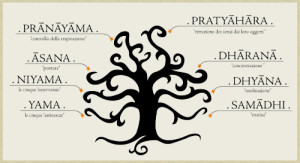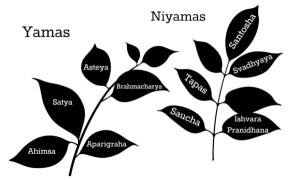 Some say the eight limbs of yoga are more like concentric circles that move from our outermost experiences to our innermost. As we calm the compulsions and drama of each layer we are organically drawn deeper inside. Conversely, if we are constantly “fighting fires” with drama in relationship, disorganized living conditions, weak or sick bodies, and fragmented minds, we are less likely to find our way inward to our own hearts.
Some say the eight limbs of yoga are more like concentric circles that move from our outermost experiences to our innermost. As we calm the compulsions and drama of each layer we are organically drawn deeper inside. Conversely, if we are constantly “fighting fires” with drama in relationship, disorganized living conditions, weak or sick bodies, and fragmented minds, we are less likely to find our way inward to our own hearts.
 The first two limbs of this eight-limb system are called Yama and Niyama. Yama means “curbing”. The 5 Yamas guide us to curb impulses so our relationships with others are more harmonious and less dramatic and harmful. The Yamas are typically defined as “things to NOT do”. You can think of them like the commandments, “Thou shall not…”. However, it can be powerful to flip the polarity and list them as active practices. For example, Ahimsa means “do no harm” but we could define the flip side and say Ahimsa is the active practice of Loving Kindness. Here are the 5 yamas with their classic definition and the positive polarity.
The first two limbs of this eight-limb system are called Yama and Niyama. Yama means “curbing”. The 5 Yamas guide us to curb impulses so our relationships with others are more harmonious and less dramatic and harmful. The Yamas are typically defined as “things to NOT do”. You can think of them like the commandments, “Thou shall not…”. However, it can be powerful to flip the polarity and list them as active practices. For example, Ahimsa means “do no harm” but we could define the flip side and say Ahimsa is the active practice of Loving Kindness. Here are the 5 yamas with their classic definition and the positive polarity.
1. AHIMSA – non harming – the practice of loving kindness to all beings
2. SATYA – honesty – telling the truth and living your truth and the truth of our oneness
3. ASTEYA – non stealing – only take what is freely and clearly given, including energy and time
4. BRAMACHARYA – sexual purity – respect intimate relationship; treat your beloved as divine
5. APARIGRAHA – non grasping – release neediness and attachment, celebrate the success and happiness of others and offer compassion when others suffer
The second branch of the eight branches of yoga is called NiYama. These are five personal observances that help us manage our personal lives to bring out the best in ourselves. The prefix “Ni” is like “un” or “non” in English. So the Niyamas are inviting us to be very liberal with these practices. Niyama basically means “don’t hold back!” So these are five things we want to rev up in our lives.
1. SAUCHA – cleanliness and order in body mind and home
2. SANTOSHA – contentment – active appreciation for our efforts and our blessings
3. TAPAS – passion and determination to strive for betterment even when severely challenged
4. SVADYAYA – study of self and scriptures – willingness to look at where we are out of alignment, how we got there and how we can refine ourselves
5. ISHVARAPRANIDHANA – surrender of all effort to the grace that supports all life – trust in divine order and the flow of life
